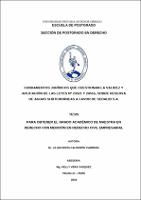Fundamentos jurídicos que cuestionan la validez y aplicación de las leyes N° 23521 y 24516, sobre reserva de aguas subterráneas a favor de SEDALIB S.A.

View/
Download
(application/pdf: 3.754Mb)
(application/pdf: 3.754Mb)
Date
2018Author(s)
Calderón Cabrera, Lilian Sofia
Metadata
Show full item recordAbstract
Es una verdad irrefutable, que en nuestro país, los recursos hídricos son recursos
naturales de patrimonio de la Nación, sobre los cuales se pueden otorgar
derechos para su uso y aprovechamiento, sujetos al pago una contraprestación
económica en favor del Estado. Sin embargo, en el ordenamiento jurídico
nacional, existen las Leyes N° 23521 - Ley de Reserva de las aguas subterráneas
de la cuenca del río Moche (Trujillo), en favor de la SEDAPAT (ahora SEDALIB
S.A.); y N° 24516 - Ley de Reserva de las aguas subterráneas de las cuencas de
los ríos de las provincias de Chepén, Ascope, y Trujillo, a favor de SEDAPAT
(ahora SEDALIB S.A.), que otorgaron la reserva de las aguas subterráneas de
estas cuencas a favor de SEDALIB SA, con la finalidad de asegurar el
abastecimiento de agua potable a la población e industria ubicada en su
circunscripción, facultándole al cobro de una tarifa de uso de agua, que quedó
aprobada mediante Decreto Supremo N° 033-86-VC, y que viene siendo materia
de cobranza judicial y extrajudicial a usuarios de fuente propia con fines
productivos; sin embargo, actualmente se cuestiona la validez y aplicación de
dichas leyes, por cuanto, por un lado, han sido emitidas por un órgano
incompetente, y por haber quedado derogadas tácitamente; y, por otro lado,
porque se vienen aplicando a usuarios no comprendidos en sus supuestos
normativos, y SEDALIB SA carece de un derecho de uso otorgado sobre el
recurso reservado. Estos cuestionamiento han generado la interposición de
procesos judiciales en los cuales los Jueces Especializados y Superiores de la
Corte Superior de Justicia de La Libertad, y los Jueces Supremos de la Corte
Suprema de la República, ha planteado posiciones distintas y hasta
contradictorias entre sí, haciéndose necesario que se determine la configuración
de los fundamentos que cuestionan la validez y aplicación de estas leyes, y ello
pueda servir de referencia para la solución de causas pendientes de
pronunciamiento final, y poner fin a la controversia surgida al respecto. It is an irrefutable fact that in our country, water resources are natural resources of
the Nation's heritage, on which rights can be granted for their use and exploitation,
conditioning the payment of an economic consideration in favor of the State.
However, in the national legal system, there are the Laws No. 23521 - Law on the
Reservation of Groundwater in the Moche River Basin (Trujillo), in favor of
SEDAPAT (now SEDALIB S.A.); and No. 24516 - Law on the Reservation of
Groundwater in the River Basins of the Provinces of Chepén, Ascope, and Trujillo,
in favor of SEDAPAT (now SEDALIB SA), which granted the reserve of the
groundwater of these basins in favor of SEDALIB SA, with the purpose of
guaranteeing the supply of drinking water to the population and industry located in
its circumspcription, authorizing the charge of a water use fee, which was
approved by Supreme Decree No. 033-86-VC , and that is being a matter of
judicial and extrajudicial charge to users of their own source for productive
purposes; however, the validity and application of these laws is currently
questioned, since, on the one hand, they have been issued by an incompetent
body, and so they have been tacitly repealed; and, on the other hand, because
they have been applied to users not included in their regulatory assumptions, and
SEDALIB SA does not have a right of use granted over the reserved resource.
These questionings have generated the interposition of judicial procedures on
which the Specialized and Superior Judges of the Superior Court of Justice of La
Libertad, and the Supreme Judges of the Supreme Court of the Republic, have
proposed different and even contradictory positions, becoming necessary to
determine the configuration of the basis that question the validity and application
of these laws, and that can serve as a reference for the solution of unsetteld
causes of final pronouncement, and put an end to the controversy emerged about
it.

